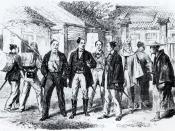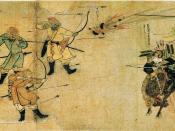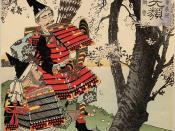Analysis Paper
Abare 3
Christopher Abare
History 337
09/29/2014
The Rite of Honorable Death
"They were not afraid of death and did not show any sign of pleading for life." (Ikegami 96) This demonstration of no fear in death became the norm in samurai of this time period. Honorable death was put above all else. The new era began with the samurai thought process of dying on the battlefield and not coming back. This practice is one that as a soldier in the Army makes sense but at the same time does not. When I was deployed I thought about the fact that I might not come back home to the United States and sometimes thought that I might not even make it back to the base I was at while deployed, but to just accept that fact was more a way of suicide than of honorable thinking. Everyone wants to come home.
Even the biggest and badest guys in Special Forces have a fear of not returning home. Just the thought of going into war and telling myself I am not making it home scares me, so I have a lot of respect for the samurai that just walked into battle thinking this.
Vassals were hired as private warriors by the upper class because the upper class did not want to become impure by fighting in these wars. Even though the warriors were hired to be small armies, the samurai did not like organized movement of troops. For example, Minamoto no Yoshitsune was disliked by his vassals because he was one of the only ones who liked organized military type movement. While the samurai were in battle, they made sure that their accomplishments were witnessed by comrades so that they could be awarded glory appropriately as well as being...


